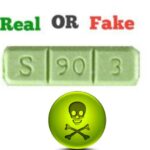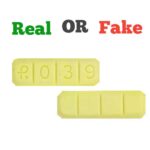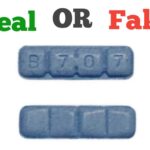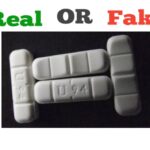How To Spot Fake Green Xanax Bars
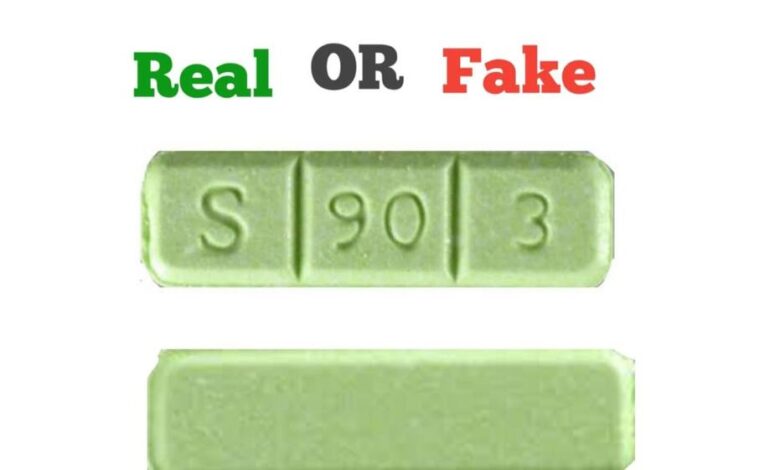
Xanax (Alprazolam) belongs to a class of medications called benzodiazepines which act on the brain and nerves (central nervous system) to produce a calming effect. It is used to treat anxiety and panic disorders and works by enhancing the effects of a certain natural chemical in the body known as Gamma-Aminobutyric acid (GABA) or γ-aminobutyric acid. GABA is the chief inhibitory neurotransmitter in the developmentally mature mammalian central nervous system. Its principal role is reducing neuronal excitability throughout the nervous system. (GABA).
Generic versions of the drug like the green, rectangular pill with the imprint S 90 3 supplied by Dava Pharmaceuticals. The pale green Xanax S 90 3 bars have two scores, instead of three, so they can be broken into three equal 0.66mg squares. They contain alprazolam 2 mg. The highest-strength dose of Xanax is a green 3-mg extended-release tablet. That pill is triangular, not bar-shaped. Because of the wide variety of strengths and manufacturers, you should never take alprazolam unless it’s been specifically prescribed to you and came from its original prescription pill bottle.
How to Spot Fake Green Xanax Bars
In their latest report on fake online pharmacies that ply their trade in the United States, the National Association of Boards of Pharmacy (NABP) found more than 1,500 new websites that it considers “Not Recommended,” and of these, 31% are offering illicit prescription drugs. Studies have shown that poor quality medicines represent a global threat to public health that can result in treatment ineffectiveness, drug resistance, increased morbidity and mortality rate, economic loss, and problems for the healthcare system.
As a consumer, you may not have access to most of the test equipment used by regulatory bodies to verify the identity of a drug product. The following tips will serve as a guide to purchasing genuine green Xanax bars pills and help you avoid fakes;
Visual inspection
Visual inspection as stated by the World Health Organization (WHO) (1999) still remains the first step in identifying potential fake drugs irrespective of the analytical methods used. This is because such observation serves as a lead to identifying fake products even in the absence of knowledge of the physical characteristics of a genuine drug product. You are expected to examine carefully both the package and its content before purchase or use.
Visual Inspection of the Package
You should:
- Examine the package and check if it appears suspicious or different from what you previously know.
- Check if the security seal has been tampered with by looking for breaks or tears in the sealing tape and seals.
- Look for unusual fonts, font sizes, print color, and spelling errors.
- Check the legibility of the information on both the primary and secondary packages.
- Check if the batch number, expiry date, and manufacturer’s address on the secondary package are the same as that on the primary package.
- Check if the manufacturer’s address is traceable, that is, if it contains the exact location of the company and not just the country address.
- Check if the registration number (FDA number as the case is for products marketed or sold in the United States) is properly printed or if it appears to be tampered with.
Visual inspection of the Dosage form
At this stage, you are meant to Check for differences in the physical appearance (color uniformity, size, shape, consistency, etc.) of the drug. As stated by WHO, commonly encountered physical defects that should be looked out for in tablets include:
- Excessive powder and/or pieces of tablets at the bottom of the container (from abraded, crushed, or broken tablets);
- Cracks or chips in the tablets, swelling, mottling, discoloration, fusion of tablets;
- The appearance of crystal on the walls of the container or on the tablet.
- Hardening or softening, cracking, swelling, mottling or discoloration of the capsule shell should also be looked out for.
Source
The source of the drug also determines if you are buying a fake green Xanax bar or not. Buying Mexican green Xanax bars exposes you to a lot of risks. Filling your prescription in a reputable pharmacy greatly reduces your chances of buying fake drugs while buying from illiterate and unqualified vendors who hawk drugs in buses, motor parks, and in the streets increases your chances of buying fake drugs.
Price
This is another way of identifying fake green Xanax bars. If the price is far cheaper than what is expected, then you have to think twice. However, this may not always be true, especially for some products (fake innovator/generic brands) which may be sold at the same price as genuine ones.
Unexpected side effect
Counterfeit green Xanax bars most of the time contain substances other than the appropriate Active Pharmaceutical Ingredient (API). They may contain incorrect substances, improper dosage, or hazardous substances like Fentanyl which produce unusual side effects, and worsening medical conditions after taking it. The medication should be stopped once any of the above is noticed.
Fentanyl Test
Fentanyl testing is one of the most reliable ways of telling a fake from real green Xanax bars. A new University of Maryland study found fentanyl tops the list of drugs detected in overdose patients at two Baltimore hospital emergency departments. The finding suggests that hospitals and medical systems throughout the United States consider adding fentanyl, a potent synthetic opioid linked to most fatal overdoses in Maryland, to their routine drug testing panels. That is the conclusion of researchers at the University of Maryland School of Medicine (UMSOM) and the Center for Substance Abuse Research (CESAR) at the University of Maryland, College Park. Currently, fentanyl is not routinely included in these panels nationwide. The procedure described below can help law enforcement agents and public health officials to pick out fentanyl-laced powders and pills.
Steps
- Crush the pill or pour the powder into a clean bowl or test tube
- Add ¼ inch of clean water to the powder in the tube or bowl and mix properly
- Dip the end of the test strip into the residue for 15 seconds, remove it, and lay it on a clean flat surface
- Check the strip after 5 minutes, (manufacturer’s directions) results may be visible sooner: One line means fentanyl (positive) Two lines mean no fentanyl (negative) NOTE: If the strip does not either have one or two lines, the test is invalid.
According to the Pharmaceutical Research and Manufacturers of America, consumers who purchase medications online should avoid the following: sites that are located outside of the U.S. that do not indicate any physical address; sites that do not have a license by the relevant State Boards of Pharmacy; sites without a licensed pharmacist to answer questions; and websites that do not require a prescription.
Consumers who wish to purchase drugs over the Internet should look for websites that have the Verified Internet Pharmacy Practice Sites seal. These sites, which are created by the National Association of Boards of Pharmacy, are licensed pharmacies selling FDA-approved medications to discourage the sale of counterfeit drugs from illegitimate online sources.

